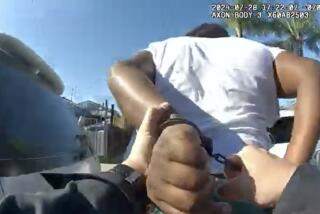Cameras urged for watching the police
- Share via
Alarmed by a number of incidents involving police abuse allegations, civil rights groups called Friday for the Los Angeles Police Department to install surveillance cameras in all police stations and to expedite putting the devices in all patrol cars.
LAPD officials said they were taking steps to carry out that task.
It was a video surveillance camera installed in the Central Division station that captured images of an officer allegedly assaulting a 16-year-old detainee while the youth was handcuffed this week, leading Police Chief William J. Bratton on Thursday to announce the officer’s arrest.
However, LAPD officials acknowledged Friday that video surveillance systems have not been installed in several police stations and that the city is just beginning to test putting cameras in patrol cars. The Los Angeles County Sheriff’s Department does not have video cameras in its patrol cars either, a representative said.
Without cameras in patrol cars, investigators have had to rely on bystanders’ videotapes when looking into allegations of police abuse, including a case disclosed last month in which an officer in Hollywood was taped repeatedly punching a man in the face.
“We think it will not only protect the police officers from false accusations but also will protect suspects, and it gives us a more complete picture when things happen,” said Ramona Ripston, executive director of the American Civil Liberties Union of Southern California, one of the groups that called Friday for immediate action.
Also supporting the idea were Vacie Thomas, executive director of the Los Angeles branch of the National Assn. for the Advancement of Colored People; Blair Taylor, president and chief executive of the Urban League in Los Angeles; and Larry Aubry of the group Community Call to Action and Accountability.
“The devices will help because they will provide oversight we don’t have now,” Aubry said.
Thomas said that without cameras, it is often hard for people to prove abuse if it is their word against an officer’s.
“If they are as good as they say they are,” Thomas said, “they shouldn’t have a problem with cameras in police stations.”
The leaders said the department should speed up installation of video cameras in all 1,200 patrol cars -- a $25-million project that is proposed to be phased in over four years.
“I don’t think it should take that long,” Aubry said. “That needs to be expedited.”
The Police Protective League, which represents rank-and-file officers, supports cameras in patrol cars as a way to protect officers against false claims of misconduct but has not taken a public position on cameras in stations, representatives said Friday.
Bratton said video cameras are being installed as the department builds and renovates police stations, but that leaves at least eight older facilities without surveillance systems.
“In all of our new police stations, we have significant numbers of internal cameras as well as perimeter cameras,” Bratton said. “There are extensive camera systems in all our holding rooms, interview rooms. We are moving in that direction.”
According to the LAPD, 11 of its 19 stations -- plus police headquarters -- have some closed-circuit television system monitoring parts of the building.
Lt. Paul Vernon said that since the Central Division incident, the department has learned that many of the juvenile holding rooms -- often converted offices with a door -- aren’t monitored by video.
Vernon said Bratton has directed an immediate assessment of ways to address that shortcoming.
Among the stations without cameras are Newton, North Hollywood and Northeast.
Assistant Chief Earl Paysinger said the department is trying to get $300,000 to $400,000 to install cameras in the LAPD main jail. “It is better to pay $300,000 or $400,000 than pay out $2 million in a lawsuit if something gets hurt,” he said.
Deputy Chief Charles Beck said that in the South Bureau -- which covers South Los Angeles -- installation of cameras in police cars should begin on a widespread basis by summer.
Four vendors have agreed to produce trial models to help the city select which system to use. Beck said that within a year, 300 cars will have the cameras.
The mayor and City Council have been wrestling with financial problems in the last few years that caused them to decide to roll out cameras in patrol cars over four years.
The chairman of the council’s Public Safety Committee said Friday, however, that if current tests on cameras in police cars are successful, he will propose to move up their installation in all patrol cars.
“I would vote to front the money to expedite it,” Councilman Jack Weiss said. “You can pay for the technology now or pay on lawsuits later, and lawsuits cost more.”
Weiss agreed that surveillance systems are a good idea, but said they would do less to prevent police misconduct than would strong leadership, which he said Bratton has shown by announcing the arrest of the officer in the latest incident.
Bratton kept the issue alive in a speech to graduating recruits Friday at the Police Academy.
“Vow that you will never, under any circumstances, cross the line; that you will never abuse the power that you are given,” Bratton told the class of 47 officers.
“If you do -- if you behave like the criminals that we are asked to deal with -- you’ll be treated like a criminal,” he added.
“We will find you, we will arrest you, we will prosecute you, we’ll do our best to ensure that the stain that you might create is removed from this department.”
[email protected] [email protected]
More to Read
Sign up for Essential California
The most important California stories and recommendations in your inbox every morning.
You may occasionally receive promotional content from the Los Angeles Times.











